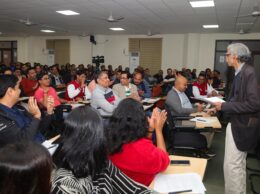The discontinuation of classroom learning due to COVID-19 lockdown is bound to impact the nation’s 200 million student community negatively, if educational institutions and the government do not proactively change the standard methodology of teaching asap.
A beginning has already been made by some schools and institutions, who have quickly embraced e-learning solutions that have the potential to reboot and reset the Indian Educational system. Caution should be taken while embracing new technology so that they are not quick fix solutions and will not lead to any sustainable learning outcomes.
Manipal Technologies Limited (MTL), one of India’s most trusted print and technology major, had forayed into online learning solutions way back in 2015. Partnering with the largest Kenya based publisher Longhorn Publisher PLC, MTL had developed and implemented the Longhorn Learning Platform across 150+ institutes in Kenya, that benefits over 250 thousand students. The learning management platform was built considering the poor and low internet connectivity.
According to Guruprasad Kamath, Vice President, Digital Solutions Business, Manipal Technologies Limited, “The platform, “MiClass”, was built keeping in mind the bandwidth challenges that can act as deterrents in full-fledged online education with streaming videos, etc. The platform uses e-textbooks, notes and assessments to keep students abreast with their regular curriculum and anyone with a basic smartphone can use it. The platform is light and available across both Android and iOS platforms, across the web and as a desktop app as well. Since it is light, it also negates the requirement of heavy data packs in continuing education from home.”
India, with more than 51,000 colleges and about 1.4 million schools can also take advantage of such technology in the current scenario. As of September 2019, India had more than 66 Million internet users in the age group of 5 to 11 years. India also has to overcome the challenge of teaching in vernacular languages in many of the primary and secondary schools.
Currently, all state and CBSE exams have been postponed. Professional institutes are continuing the classes using video conferencing methods to complete the syllabus. These ad-hoc methods are neither secure or provide a complete solution.
During a shift toremote teaching, one also needs to consider the low bandwidth availability, a mobile-first approach, and the language challenges that are unique to India. Over the last few weeks, there has been a significant surge of activities from the virtual classroom platforms and online course providers.
State governments in Karnataka and Telangana are mulling over using online teaching methods. Soon, other state governments might be onboard. Various state governments have already employed Smart Classes under the Smart City projects to teach the students with relevant audio-visuals effectively. However, extending that to the virtual classrooms are still one step behind.
These are the testing times and institutes might find significant cost saving on their infrastructure by transitioning to online teaching platforms. Powering up platforms like the ones built by Manipal Technologies Limited with language capabilities could be the future.








